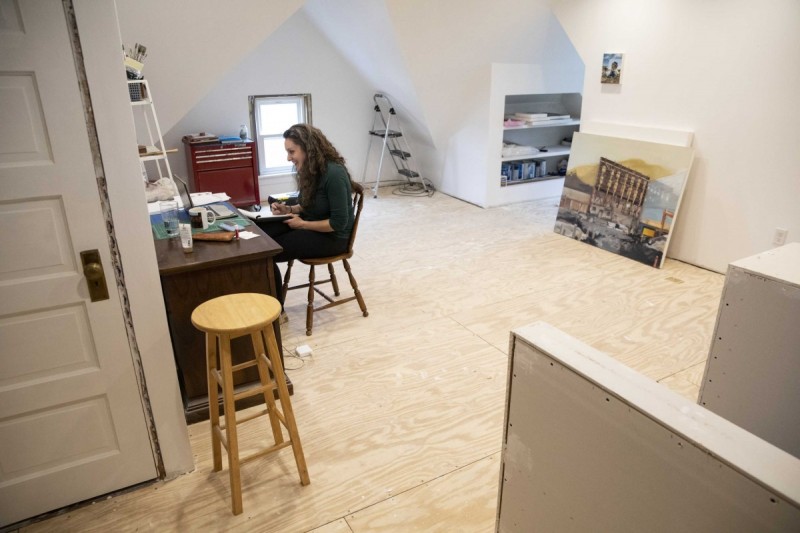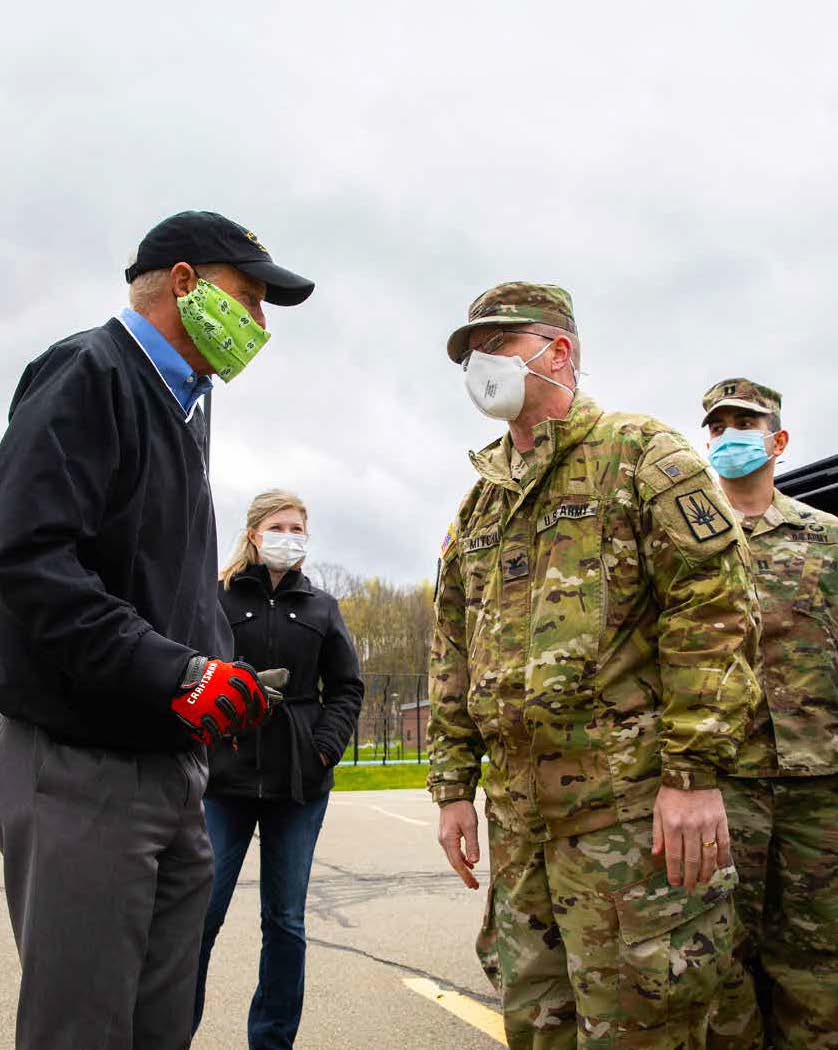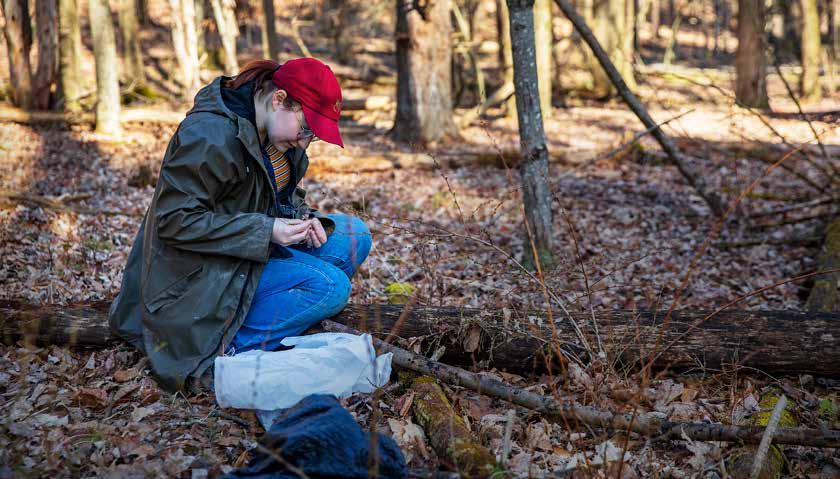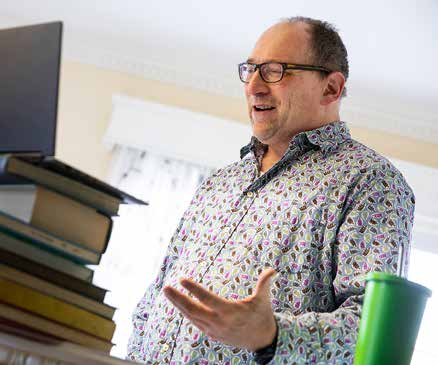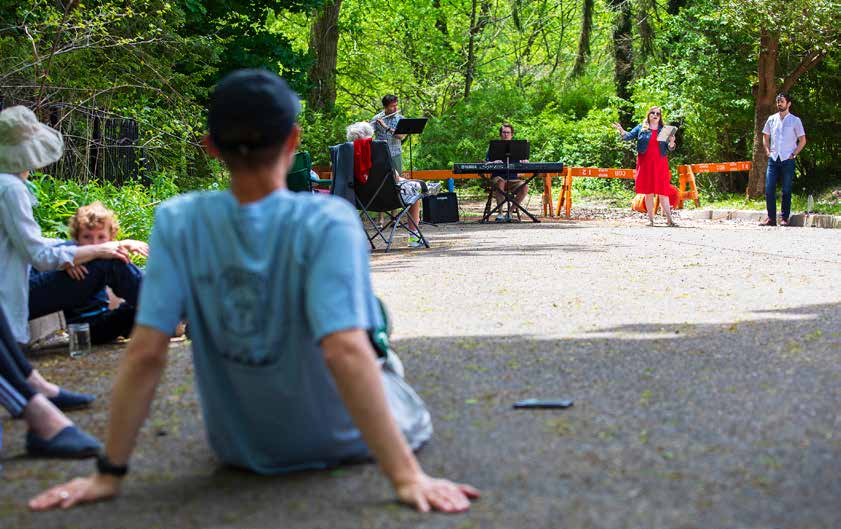A year like no other: Harpur College responds to pandemic with generosity, research and hope

Throughout its 70-year history, Harpur College has weathered the challenges and change that are part of the American story, from the social upheavals of the Vietnam War period to 9/11 and economic downturns. From its start, the coronavirus pandemic presented challenges of a different caliber, as Binghamton University worked to prevent the spread of the virus while still providing an unparalleled education.
In March, the University quickly transitioned to an all-online class format for spring and postponed Commencement. It also permitted students in most programs to take up to 12 credits of pass-fail courses — and to make that decision after seeing their letter grades.
“We understood that the social and economic consequences of the pandemic, combined with the transition to online instruction, would create challenges for many students,” says Donald Nieman, provost and executive vice president for academic affairs.
Many professors taught from their homes, connecting to students through the Zoom videoconferencing platform. Adapting in-person classes to a digital environment on short notice is no small feat, but Harpur College instructors were up to the challenge.
“Students can easily shut down, even in a physical classroom,” says Riley Assistant Professor of Mathematical Sciences Vaidehee Thatte, a postdoctoral fellow. “Online, they miss the human element. I tried to think about that as much as possible.”
To keep students engaged, she introduced whimsical elements, such as a stuffed toy crab that became the class mascot, and encouraged students to talk about their pets and interests. She also scheduled group work using Zoom’s breakout room feature, formed three study groups led by the students themselves and included breaks during the 90-minute lectures, allowing students to share messages on the virtual whiteboard.
For all its challenges, online learning did have some benefits. Students who are typically reluctant to speak up in the physical classroom participated more readily in the online format, Thatte says.
Other components of the Harpur experience also moved to Zoom, from art shows and Research Day presentations to a tour of the E.W. Heier Teaching Greenhouse, and even a musical performance of “What’s Your Story, Morning Glory?” by the Harpur Studio Jazz Band. Student services went virtual too, with Harpur Edge, Harpur Academic Advising, the Fleishman Center for Career and Professional Development and others offering appointments and access to resources via Zoom, telephone and email.
The Institute for Child Development, which serves children with Autism Spectrum Disorder, shifted its entire 330-minute school day to the digital sphere. The interactive lessons used a parent coaching model, and families also connected with school staff through regular classroom meetings, Ask an Expert sessions and a dedicated parent portal. The Psychological Clinic also moved to Zoom, adopting a telehealth model with safeguards put in place to increase security and client confidentiality.
“It’s times like these that show how truly resilient people can be,” says Craig Polizzi, a doctoral student in clinical psychology who provides services at the clinic. “The pandemic helps people reflect on themselves, their lives and their reactions to adversity.”
Campus remained open during the spring semester, although fewer than 320 students chose to remain in the residence halls and were spaced out in single rooms with private bathrooms to maintain social distancing. They included international students such as mathematical sciences major Wencong “Jacky” Qin, who hails from northeastern China. Returning home would make it difficult to take courses online, so he decided to remain — an experience that was lonely at times, and made him appreciate his connections with others.
“Social ties are quite important in times like these. For me, at least,” Qin says.
For seniors, the pandemic also meant forgoing some of the hallmarks of their final semester, and finding new ways to connect.
A member of the community service fraternity Alpha Phi Omega, environmental studies major Diana Knoell found other ways to meet with her peers: from group chats to Netflix party extensions and even prompts for creative projects. Rather than returning home to Long Island, she semester, heading out to the University’s Nature Preserve to help conduct research there.
“I understand that there are a lot of things that had to stop. But it was sad,” she says. “It hit me that I was missing out on a lot of those ‘last time’ kind of things. Commencement being pushed off — it’s a bummer. But as long as everyone is safe and healthy, it will all be OK.”
Harpur helps out
When healthcare facilities and governments put out a call for help, Harpur faculty and staff quickly mobilized and donated needed supplies. They offered up masks, plastic face shields and other protective gear, as well as tissues, cleaning supplies, sterile surgical implements and the use of specialized equipment, including 3D printers. They also volunteered their skills, from lab testing to manufacturing.
Others have found different ways to share their talents in a time of crisis, such as English Professor Liz Rosenberg, who conducted public readings on Facebook twice a day for both children and adults.
Tommy Iafrate, director of musical theater, and partner John Cockerill, an assistant conductor at Tri-Cities Opera, held Sunday mini-concerts on their Binghamton street to lift the neighborhood’s spirits. Their neighbor, head tennis coach Nick Zieziula, sparked the idea when he asked Iafrate to play Easter hymns for his family, which was unable to attend Mass in person.
“It felt so wonderful to gather together and enjoy a shared experience that John and I decided to keep it up by playing a 15- to 20-minute concert every Sunday at noon,” Iafrate says. “Since we’re on a dead end at the Susquehanna River, the environment is beautiful and allows for neighbors to gather in a socially distant way.”
The coronavirus also sparked research, funded in part by the SUNY Research Seed Grant Program and drawing faculty members from chemistry, math, physics and economics. Projects include the development of a rapid screening detector for coronavirus and other biological agents, mathematical predictions of the pandemic’s spread and respiratory monitoring for detection and tracking, as well as a look at the factors influencing whether individuals adhere to social distancing guidelines.
Distinguished Professor of Psychology Steven Jay Lynn and Polizzi partnered with Andrew Perry, retired from SUNY Oneonta’s James M. Milne Library, for “Stress and Coping in the time of COVID-19: Pathways to Resilience and Recovery,” an article published in a special issue of the academic journal Clinical Neuropsychiatry.
“It is no surprise that the Harpur College faculty and staff have been so generous — and so creative — in their response to this crisis. This is the best of the arts and sciences — gifts of surgical masks and gifts of poetry!” Interim Dean Celia Klin says. “This is what makes Harpur College such a special place.”
